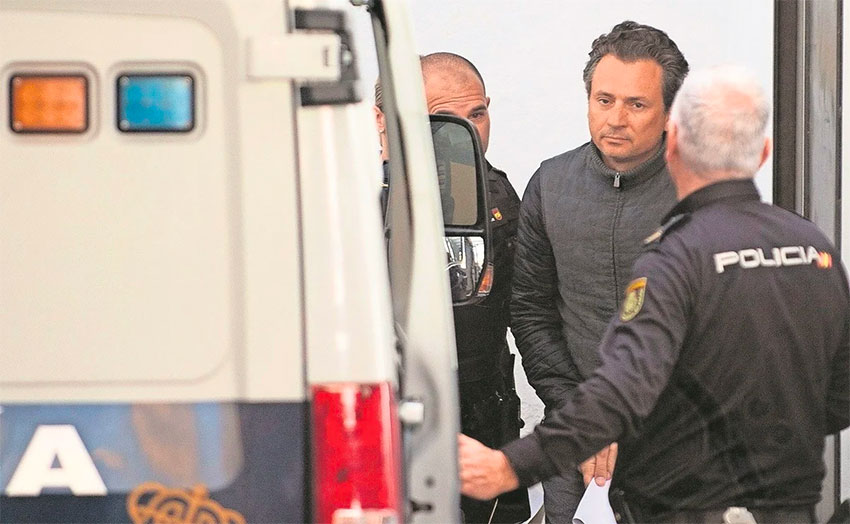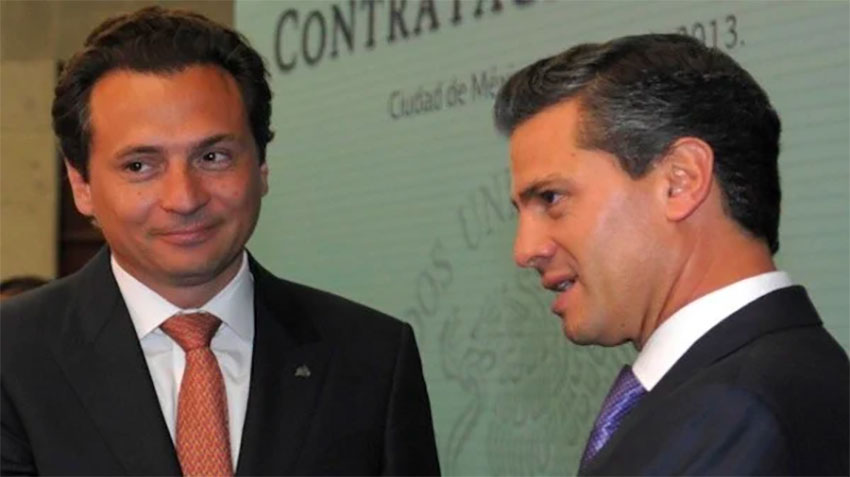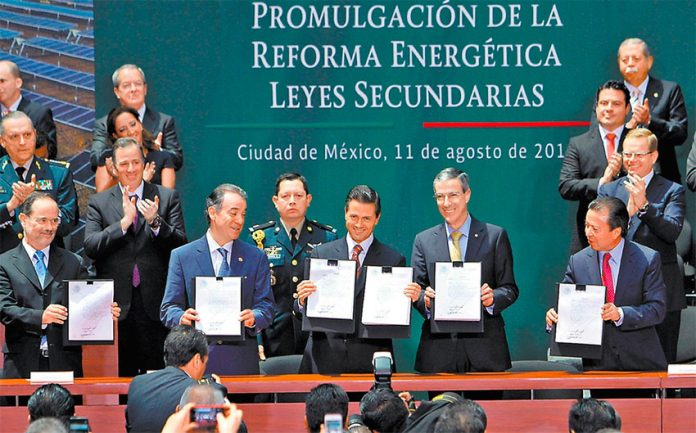Former Pemex CEO Emilio Lozoya – arrested in Spain on corruption charges in February and expected to arrive in Mexico on Thursday – has agreed to hand over at least 12 videos of politicians accepting bribes in exchange for supporting the former government’s energy reform and other initiatives, according to sources cited by the newspaper Reforma.
The newspaper reported on Wednesday that sources with knowledge of Lozoya’s case say there are 16 hours of footage in which federal senators and deputies are seen receiving bribes before voting on the energy reform in late 2013.
According to the sources, money was handed over to the lawmakers in Lozoya’s offices in the Mexico City Pemex tower and in another nearby building where the former CEO also had an office.
The sources didn’t say which lawmakers received bribes but Reforma listed the main opposition party negotiators whose support was required by the the then-ruling Institutional Revolutionary Party (PRI) in order to pass the constitutional reform that opened up Mexico’s energy sector to private and foreign companies.
Reforma said the main negotiators in the Senate were National Action Party (PAN) senators Salvador Vega Casillas, Jorge Luis Lavalle, Raúl Gracia Guzmán, Francisco Domínguez and Francisco García Cabeza de Vaca.

Domínguez is now governor of Querétaro, and García is governor of Tamaulipas.
Reforma said that former Democratic Revolution Party senator Miguel Barbosa, now governor of Puebla for the Morena party, was also closely involved in the negotiations.
In the lower house of Congress, former PAN deputy Ricardo Anaya – the party’s candidate in the 2018 presidential election – and Luis Alberto Villarreal, who was fired as PAN house leader in 2014 after a video emerged of him partying with young women reported to be table-dancers or sex workers, were key energy reform negotiators.
Among lawmakers from other opposition parties involved in negotiations with the PRI were Arturo Escobar and Pablo Escudero of the Ecological Green Party of Mexico (PVEM).
Speaking at his news conference on Wednesday morning, President López Obrador acknowledged that “there is information that there were bribes to obtain votes for the energy reform.”
“All this must be made known,” he said, adding that it’s a good thing that Lozoya has agreed to return to Mexico and committed to “informing about this situation.”
“We’re interested in the whole truth because we have to put an end to corruption, pull it out by the roots,” López Obrador said.
Asked who exactly received bribes in exchange for supporting the energy reform, the president responded that he wasn’t privy to that information.
“I don’t have direct information, it’s an investigation of the Attorney General’s Office [FGR]. … [However], citizens know and the president knows that there was a lot of corruption in Pemex during that period,” López Obrador said, referring to the 2012-18 term of former president Enrique Peña Nieto.
In addition to the bribes, the president cited the Odebrecht case, in which Lozoya was allegedly paid multi-million-dollar bribes in exchange for awarding a lucrative refinery contract to the Brazilian construction company, and the 2015 purchase by Pemex of a rundown fertilizer plant in Coatzacoalcos, Veracruz, at an allegedly vastly inflated price.
“According to the valuations, they paid at least US $200 million too much,” López Obrador said.
Lozoya, who was a close associate of Peña Nieto, was arrested in Málaga, Spain, in February on corruption charges related to the Odebrecht and fertilizer plant cases.

In late June, he dropped his extradition fight and Mexican Attorney General Alejandro Gertz Manero said the former Pemex chief had “offered his collaboration to establish and clarify the matters of which he has been accused.”
A government plane left Mexico City for Madrid on Thursday to collect Lozoya and bring him home. It is expected to return to the Mexican capital on Thursday.
López Obrador said Tuesday that Lozoya’s arrival in Mexico will help to “clear up” a range of corruption matters, including how the PRI obtained the votes needed to put an end to Mexico’s constitutionally-enshrined energy sector monopoly.
Ninety-five senators voted in favor of the reform in a sitting on December 12, 2013 to make it law. Fifty-three of that number were PRI senators, 35 represented the PAN and seven were with the PVEM. Just 28 Senators opposed the reform.
López Obrador, long an outspoken critic of the sweeping changes to energy policy, renewed his attack on the constitutional change on Tuesday.
“They sold us the idea that more oil was going to be produced, that foreign investment was going to arrive in torrents, that a lot of jobs were going to be created, that the price of gasoline and electricity was going to go down. But it was the complete opposite,” López Obrador said.
For his part, the leader of Morena in the lower house of Congress, Mario Delgado, said that Peña Nieto will not be exempt from investigations into corruption allegedly committed during his presidency.
“The Attorney General’s Office will have to do the corresponding investigations and sanction corruption no matter who falls. There mustn’t be exceptions nor protected people, not even the ex-president,” he said.
Peña Nieto’s six-year term between 2012 and 2018 was plagued by corruption scandals including the so-called “master fraud” scheme in which government agencies allegedly diverted billions of pesos in public money via shell companies, and the “white house” affair, in which Peña Nieto’s now ex-wife purchased a mansion built by a favored government contractor.
With Lozoya, who also worked on Peña Nieto’s 2012 campaign, apparently willing to shine a light on corruption during the previous federal government’s term – and soon to be on Mexican soil – the former president and members of his government may well be starting to feel quite nervous.
